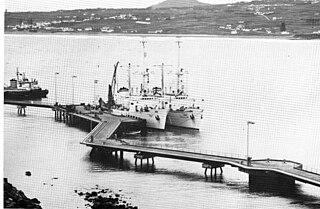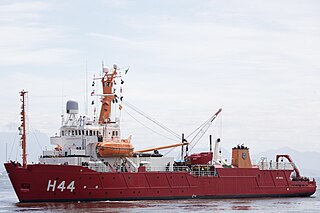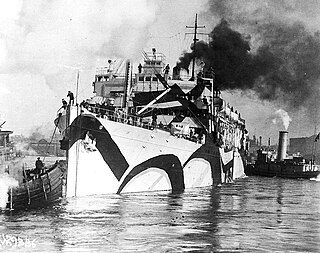 W
WUSNS Sands (T-AGOR-6) was a Robert D. Conrad-class oceanographic research ship operated by the Military Sealift Command (MSC) for the Naval Oceanographic Office from 1965 to 1973. During that period she provided ocean-bottom information and underwater test data to the U.S. Navy and other U.S. agencies. The ship was the second naval vessel to be named for Rear Admiral Benjamin F. Sands and his son Rear Admiral James H. Sands, the first being the destroyer Sands (DD-243). The ship operated in the Atlantic on oceanographic and geophysical assignments for the Oceanographic Office and other agencies.
 W
WNT Almirante Gastão Motta is an Almirante Gastão Motta-class replenishment oiler of the Brazilian Navy. The Almirante Gastão Motta was ordered by the Brazilian Navy on 15 December 1987. The ship was launched on 1 July 1990, and was commissioned on 26 November 1991.
 W
WAlmirante Maximiano (H-41) is an ice-strengthened oceanographic research ship of the Brazilian Navy. The ship bears this name in honor of Admiral Maximiano Eduardo da Silva Fonseca. It was built by the Todd Pacific Shipyards of Seattle, Washington, and was launched on 13 February 1974. It was acquired by the Brazilian Navy on 3 September 2008 for the Brazilian Antarctic Program. Prior to Brazilian service, the ship served commercial operations under the names Ocean Empress, Naeraberg, American Empress, Maureen Sea, Scotoil I and Theriot Offshore I.
 W
WAry Rongel (H44) is an ice-strengthened oceanographic research ship of the Brazilian Navy. It was built by the Georg Eide's Sønner of Høylandsbygd, Norway as Polar Queen and was launched on 22 January 1981. It was acquired by the Brazilian Navy in 1994 for the Brazilian Antarctic Program.
 W
WUSS Orizaba (ID-1536/AP-24) was a transport ship for the United States Navy in both World War I and World War II. She was the sister ship of Siboney but the two were not part of a ship class. In her varied career, she was also known as USAT Orizaba in service for the United States Army, and as SS Orizaba in interwar civilian service for the Ward Line, and as Duque de Caxias (U-11) as an auxiliary in the Brazilian Navy after World War II.
 W
WUSS Skylark (ASR-20) was a Penguin-class submarine rescue ship of the United States Navy.
 W
WUSS Orizaba (ID-1536/AP-24) was a transport ship for the United States Navy in both World War I and World War II. She was the sister ship of Siboney but the two were not part of a ship class. In her varied career, she was also known as USAT Orizaba in service for the United States Army, and as SS Orizaba in interwar civilian service for the Ward Line, and as Duque de Caxias (U-11) as an auxiliary in the Brazilian Navy after World War II.
 W
WCGS Margaret was the first vessel to be built specifically for the Canadian Customs Preventive Service. Delivered in 1914, she was transferred to the Royal Canadian Navy and served as HMCS Margaret during the First World War. Following the war, Margaret was returned to the Customs Preventive Service spending most of the 1920s intercepting smugglers during American Prohibition. In 1932 the ship was transferred to the Royal Canadian Mounted Police. The ship was sold shortly thereafter, and was subsequently acquired by the Brazilian Navy and renamed Rio Branco, utilized as a hydrographic survey vessel. Rio Branco was discarded in 1958.
 W
WUSNS Sands (T-AGOR-6) was a Robert D. Conrad-class oceanographic research ship operated by the Military Sealift Command (MSC) for the Naval Oceanographic Office from 1965 to 1973. During that period she provided ocean-bottom information and underwater test data to the U.S. Navy and other U.S. agencies. The ship was the second naval vessel to be named for Rear Admiral Benjamin F. Sands and his son Rear Admiral James H. Sands, the first being the destroyer Sands (DD-243). The ship operated in the Atlantic on oceanographic and geophysical assignments for the Oceanographic Office and other agencies.
 W
WUSS Skylark (ASR-20) was a Penguin-class submarine rescue ship of the United States Navy.